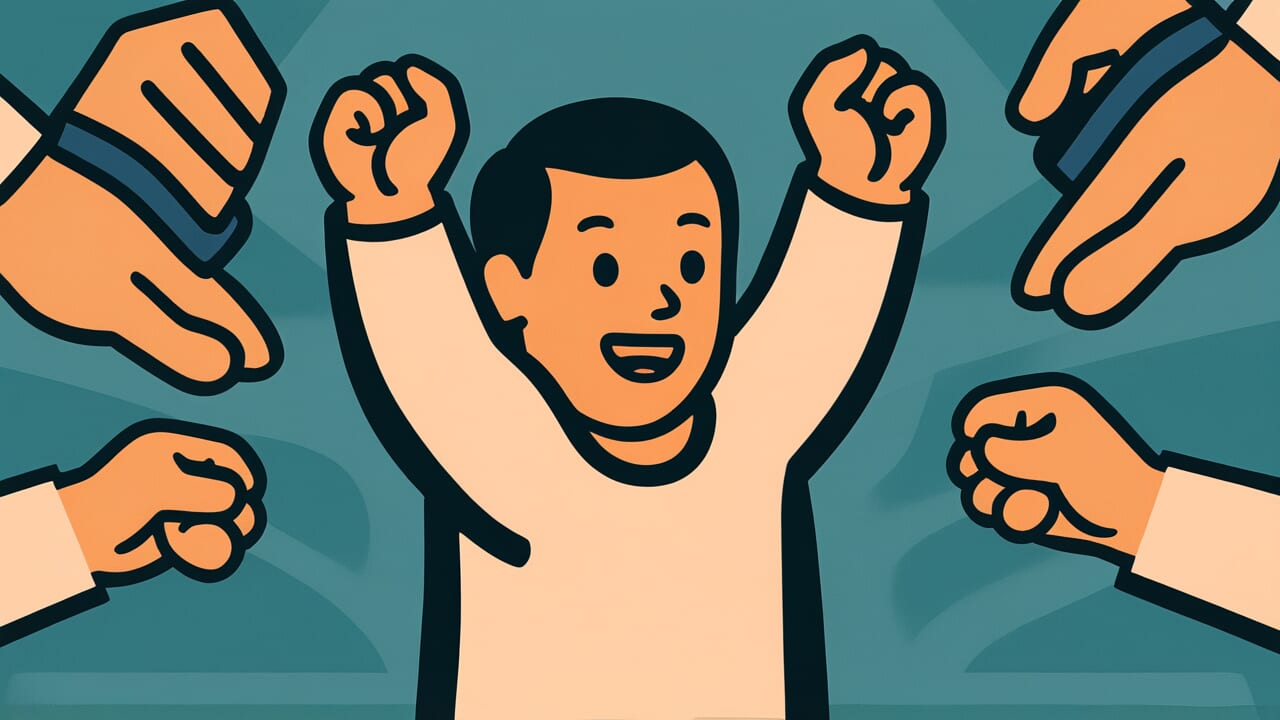How to Read “A clenched fist returns to normal”
Nigirikobushi no sumodori
Meaning of “A clenched fist returns to normal”
“A clenched fist returns to normal” means returning empty-handed after going out to work or seek money without achieving any results.
This proverb describes situations where you tried desperately to gain something but ended up with nothing.
You went out looking for work but nobody hired you. You visited acquaintances to borrow money but nobody would lend to you. These are the kinds of fruitless efforts this saying refers to.
People use this expression when explaining unsuccessful outcomes for themselves or others.
When someone says “Today was another clenched fist returns to normal,” it conveys that they went out with expectations but came back without any results.
This expression is more powerful than simply saying “I failed” or “It didn’t work out.”
It captures both the hope and determination before leaving, and the emptiness felt when returning. The concrete image of a clenched fist makes that desperation feel more vivid and real.
Origin and Etymology
No clear written records exist about the origin of this proverb. However, we can make interesting observations from the words themselves.
Let’s focus on the expression “clenched fist.” When people try to obtain something or desperately grasp for something, they naturally clench their fists.
When going out to seek work or borrow money, people likely clenched their fists in their hearts. That clenched fist held their expectations, tension, and determination to “definitely grab something and bring it back.”
Then there’s the word “sumodori” (returns to normal). The character “su” means “original” or “nothing.”
It describes returning with your fist still clenched but having grasped nothing. You come back with the same empty fist you left with. This contrast lies at the heart of this expression.
From the Edo period through the Meiji era, people walking around town seeking day labor or merchants rushing about requesting loans were common sights.
The desperate situations of these people likely gave birth to this expression. The physical image of a clenched fist perfectly captures people’s emotions.
Usage Examples
- I applied for jobs all day, but ended up returning home with a clenched fist returns to normal
- Father rushed around trying to arrange funds, but it seems it was a clenched fist returns to normal
Universal Wisdom
The proverb “A clenched fist returns to normal” contains deep insight about the relationship between human effort and results.
We all want to believe that effort always brings rewards. But reality shows that sometimes, no matter how seriously we try or how desperately we run around, results don’t follow.
This proverb has been passed down through generations precisely because people have shared this harsh reality.
What’s interesting is that this proverb focuses not on failure itself, but on the state of “returning with a clenched fist.”
It expresses both the determination and expectations when leaving, and the emptiness of gaining nothing. By expressing both simultaneously, it captures the complex emotions humans experience.
This proverb isn’t just a story about failure. It shows the essence of living.
People are beings who keep moving in search of something. Even if today is a clenched fist returns to normal, tomorrow they’ll clench their fists again and go out.
Perhaps our ancestors understood that this repetition is what life is all about.
This proverb seems to quietly affirm the human figure that keeps challenging, rather than giving up when results don’t come.
Returning with empty fists is also part of life.
When AI Hears This
When you make a fist, muscles called flexors contract. This contraction consumes about 0.1 micromoles of ATP energy per gram of muscle per second.
Anyone can imagine this much. But what’s surprising is that opening your fist requires just as much energy.
Muscles can only contract. To open your fingers, you must actively contract different muscles called extensors on the back of your hand.
If you clench your fist and then relax, your fingers won’t fully open. Tendons and joint capsules provide some elastic rebound, but only about 30 percent back to the original state.
To return to a completely open hand, you must actively work the extensors and consume ATP.
Even more interesting is that the longer you keep your fist clenched, the more extra energy you need to open it.
When muscles maintain a contracted state, molecules called actin and myosin inside muscle fibers remain strongly bonded. Breaking these bonds and returning them to their original arrangement requires new ATP input.
This is why your hand feels stiff after clenching it for a long time.
In human relationships too, the longer a conflict continues, the more energy is needed for repair. This isn’t just a metaphor.
It’s the very physical law our bodies experience daily. Returning to normal is never zero-cost.
Lessons for Today
This proverb teaches modern people how to face periods without results.
Modern society tends to demand immediate results. On social media, only success stories get shared, and everyone seems to be doing well.
But in reality, many people experience “a clenched fist returns to normal.” Getting rejected by dozens of companies during job hunting, having proposals turned down, having efforts go unrecognized.
Such days are far from rare.
What matters is not dismissing experiences without results as “worthless.” Even on days you returned empty-handed, you were moving. You were challenging.
That fact itself has value. Your clenched fist is proof of your will.
This proverb also suggests the importance of “not giving up after one failure.”
Even if today brings nothing, tomorrow might be different. Many successful people finally grasped something only after experiencing countless “clenched fist returns to normal.”
If you’re currently in a period without results, that’s nothing to be ashamed of.
The act of continuing to challenge with clenched fists is already a valuable action in itself.



Comments